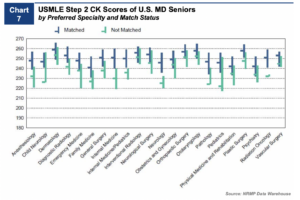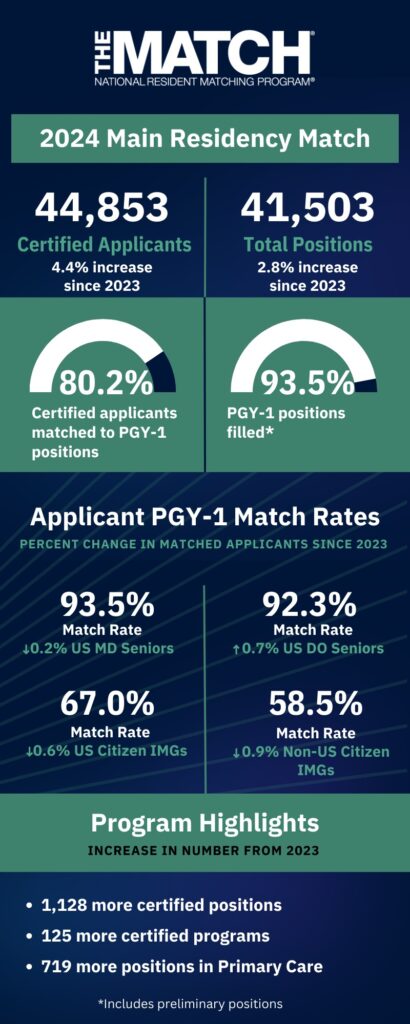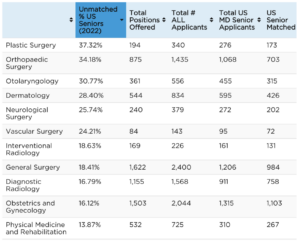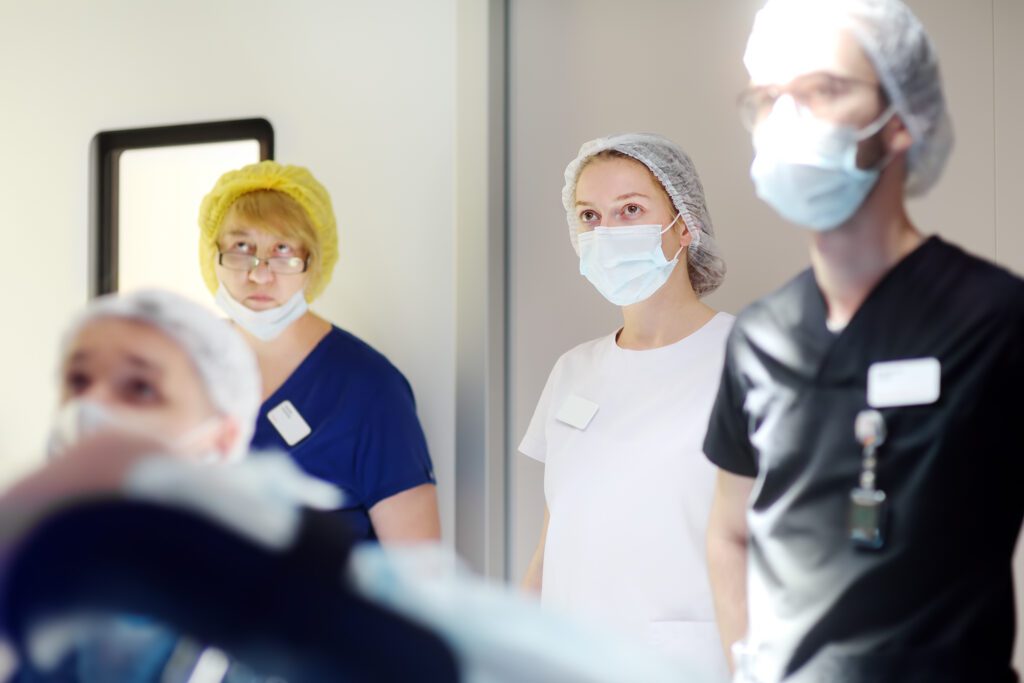The Most Competitive Medical Specialties & How to Prepare
- by
- Apr 04, 2024
- Reviewed by: Amy Rontal, MD

This post was originally published in March 2020 and was updated April 2024.
Dr. Navin Prasad also contributed to this post.
Have you recently discovered your passion for one of the most competitive medical specialties, and are wondering what you need to do to match? Then this blog is for you! Drawing from personal experiences and that of my peers, I’ll show you how success in navigating this challenging path is not only possible, but within reach. We’re going to share with you what you need to know about applying for competitive specialties, so you can increase your chances of landing the residency of your dreams.
First though, let’s have a look at what are considered the most competitive medical specialties, so you can get a sense of what you’ll need to do to match.
What are the most competitive medical specialties?
Although the landscape is ever-evolving, surgical subspecialties such as neurosurgery, ophthalmology, orthopedics, otolaryngology, urology, dermatology, plastic surgery, and interventional radiology are known to be amongst the most competitive medical specialties. These specialties often demand a research-packed application, stellar (often 250+) Step 2 scores, letters of recommendation, and active involvement beyond academic pursuits.
But don’t just take our word for it. Here are the data from NRMP:
Source: NRMP
It’s no secret the most competitive medical specialties (especially surgical subspecialties) have the highest pay grades, making them the most financially rewarding (although quite challenging to get into).
Here are the most recently available NRMP Match data:
Source: NRMP
What are the most competitive medical specialties when looking at Match rates?
One approach to determining the most competitive medical specialties is to look at Match percentages. In other words, what’s the discrepancy between how many people applied and how many were accepted?
Of course, this doesn’t take into account average USMLE scores, the number of research publications, percentage of AOA members, and more, which is published in a biennial report (last in 2022) here.
In 2022, the most competitive medical specialties by unmatched rate of US seniors were the following:
Source: NRMP
How do you stand out on your residency application?
Let’s switch gears and discuss how to stand out when preparing for a competitive residency.
We suggest the following:
1. Show your interest.
In general, successful applicants for the most competitive medical specialties have already demonstrated their interest before midway through third year. It helps to act early, even if you only have a small inkling you may be interested!
This includes doing away rotations, having faculty reach out on your behalf, using a signal on that program, and even sending an email to the program coordinator or program director.
2. Be a shining star.
Your academic performance is incredibly important when trying to match into one of the most competitive medical specialties. This is an often controversial topic; some people say preclinical grades don’t matter, and some say they do.
The way I would look at it is it can’t hurt to do your best! Clinical rotation comments and grades definitely can be helpful and USMLE scores are closely looked at. Many programs have cutoffs for board scores when they screen applicants.
After all, when a program has many more applicants than spots, there has to be a way to weed people out. Now that Step 1 is pass/fail, acing Step 2 early can make a significant difference.
3. Get involved in research.
While grades matter, sometimes connections can help you move past that one poor rotation or preclinical grade.
What does this mean? Working with a research mentor is the best way to build connections and stack your CV. Engage in research, meet deadlines, and produce quality work. Demonstrate reliability and a strong work ethic, even when juggling coursework or clinical duties.
4. Do well on your sub-internship
If you’re applying to one of the most competitive medical specialties, consider early electives with key figures in your home department and, if possible, set up shadowing opportunities before third year. During your sub-internship(s), whether at your home institution or elsewhere, be proactive, helpful, and anticipate the team’s needs. If nothing else, always be humble.
What are away rotations and why do they matter?
For the most competitive specialties, away rotations can be quite helpful. They can make your residency match or they can hurt you based on how you perform and how you mesh with the other residents.
If you’re interested in a certain region, definitely consider doing one in that region. There are many different reasons for choosing a certain program to do an away rotation at, but amongst them are opening up a new region of the US, showing dedication to a particular program, or to look at programs that are different from your home rotation to get a feel for what you’re looking for in your advanced training.
Why are research, home rotations, and away rotations so important?
Beyond making a favorable impression and gaining valuable specialty experience, these experiences can make you a familiar face in fields where everyone knows each other. Establishing a good connection with someone at one institution can open doors at another. Sometimes all it takes is one person at a program to get you in.
In addition to this, when applying to residency you’ll need letters of recommendation and the more personal your mentor can make it, the better it will speak to your ability to perform as a resident.
Now with all these details, what should you do if you’re interested in a competitive medical specialty?
If you’re interested in one of the most competitive residencies, try to do well academically during your first year and maybe get your feet wet with some shadowing. In the summer between first and second year, do some research in the field and create a good bond between you and your research PI. Your PI (principal investigator) ideally should be someone who is well connected in their field and has a solid track record of matching their applicants.
When you have time, continue to work on research and during your third year, try to take advantage of any electives you have to get more clinical experience in the field you’re hoping to pursue. If you want to maximize your chances of matching into a super competitive specialty, a research year between third and fourth year is a great idea. It’s much harder to do a research year after fourth year or if you don’t match and apply after graduating.
When it comes time to apply for residency, have trusted colleagues or mentors read your personal statement and look over your application. Ask people you believe to be good advocates for your potential as a future professional in the field.
As interview season approaches, make the most of mock interviews with a diverse group of individuals. They can be people outside of medicine, as long as they can give you credible feedback. This practice can significantly impact your performance in real interviews.
Further Reading
If you follow this advice, you’ll really increase your chances of matching into one of the most competitive medical specialties. But remember, you don’t have to do all this by yourself. Be sure to reach out if you need any help. And good luck!
Looking for more (free!) content to help you match with your dream residency program? Check out these other posts from Blueprint tutors on the Med School blog:












